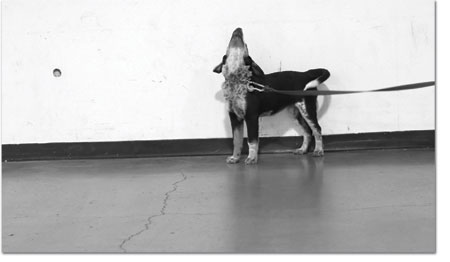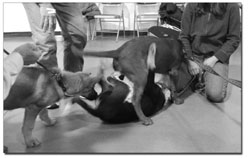|
| ||||||
| Canine 101
by Jeff Mannix
In order to subvert mass extermination, the Durango Kennel Club comes to the rescue with its puppy class. And the puppies come, straining on the end of leashes to either escape or rumble, to the La Plata County Fairgrounds every Tuesday night. This exercise toward enlightenment and companionability spans six weeks and is taught by Mel and Joyce Grimm, volunteers who must have had a near-death experience and come back with patience seen only in Buddhist monks and the bravery of snake charmers. While Mel can get a little flummoxed, Joyce is ever ready with hard-love advice and little tricks that get immediate results and do nothing to elevate Mel’s momentary lapses of authority. “Your puppy is at the end of your leash; you’re not at the end of his,” says Joyce in an endearing, school-marmish way. “We’re teaching puppy manners, and it all begins with getting your puppy’s attention and establishing you as the pack leader.” Like everything in the lives of humans and animals, achievement depends on reward. No rewards, no achievement. Simple. So with puppy training, attention is gained through the use of treats. Likewise, performance is secured with treats and consummated with praise. Once expectations are understood and behavior is reliable, the treats are phased out. “Use lots of ‘happy talk,’” exudes Joyce. “Catch your puppy doing something right and immediately praise, praise, praise.” Joyce demonstrates with dramatic inflection while Mel impatiently endures the extemporary interruption. A ragtag assortment of newbies have gathered in this winter’s puppy class. There’s Lulu, a 6-month-old English bulldog who seems overjoyed with every move she makes, as though just recovering from anesthesia. Then there’s George, a 4-month-old hyperactive Labrador that drags along his owner, bent over and always pleading for the barest sign of submission. Shadow, the Rottweiler, slinks under a chair, unwilling and uncertain to a fault. Rosie, the oblivious West Highland Terrier, always tries to figure out the shortest route to turn around. Inca is a Heeler-cross rescued from the pound. Coda, another 4-month-old Labrador, is still unable to coordinate ungainly legs. And my 9-week-old German shepherd sees only a party when he steps into the cacophonous exhibit hall filled with dogs of every description. “Pull up a piece of the floor,” sings Joyce with “y’all come” circling arms. We assemble in a tight circle herded by Joyce’s insistent gathering gestures, puppies lunging at puppies or being slid across the polished concrete floor smeared here and there by a towel from a few of the chronic leakers. “Now we are going to socialize our puppies,” says Joyce as Mel is looking though his notes in preparation for the next exercise that he is eager to instruct. “George, come. George … here comes George,” she says to the dog, who is following the treat held 2 inches from his nose. “Good puppy, George.”
Joyce then instructs the puppies to be passed4 one by one to the left, around the circle, so they can meet each other and get used to being handled, pausing at the uncertain Rott. “Shadow … well, maybe you better let Shadow stay outside the circle until he gets used to the other pups.” Above the pandemonium of mauling, tangled leashes and sprawling handlers, Joyce keeps the flow going, offering the ever-important praise. This all takes about 10 minutes, which for the humans, who are never addressed by name, was plenty long enough and for the pups was only the beginning of what promises to be pure debauchery. “OK,” voices Mel in his characteristic loud whisper that can hardly be heard above the clamor of four other training classes being conducted around the building. “Go back to the outside, take your chairs. We’re now going to teach the sit.” This most basic of commands is taught by placing a cookie in front of the pup’s nose. But first, the pups are told to “come” with a gentle but firm snap of the leash gently to get the pup’s attention. The cookie is put to the dog’s nose and then brought up to the owners’ nose while he or she says, “sit.” Mel demonstrates this technique on Inca, a wise-beyond-his-months mutt from the pens and corridors of the inner-city animal shelter. He collapses at Mel’s feet without even a pause to sit. A nervous giggle emanates from Mel as he tries unsuccessfully to coax Inca from his spraddle into the sit position. “Maybe we better try Zero,” says Mel through a clenched smile, as Inca is slid across the floor on his back to his owner, who’s barely stifling a guffaw. “Come, Zero,” Mel beseeches with his patented tug on the leash. “Sit, Zero … Good puppy!” And so it goes in puppy class. Not much gets accomplished in that one hour on Tuesday nights, but after each class a homework assignment is handed out, and therein lies the beginning of citizenship. “We know immediately at the next class who has done the homework,” Joyce boasts with the affected pride of Inspector Clouseau. “Puppies have the fully formed brains of an adult dog at seven or eight weeks, so it’s important to begin training in manners and submission right then before problems arise that are later very difficult or impossible to reverse. Dogs are pack animals,” Joyce continues, “and you have to establish right away who the pack leader is.” With all its hilarity, puppy class miraculously takes hold and looks less and less like a bass tournament as the weeks progress. Obstacles are introduced after week three, including jumps and a long, ribbed plastic tunnel that the puppies are asked to walk through toward the faces of their owners and a treat framed at the far end. Eventually comes the teeter board, providing an unsteady platform for the pups to walk across as they’re coaxed toward their pack leader and safety. Demands are made of the pups in slow, calculated steps, always leading to success and never risking refusal or fear. Everyday practice is essential, including taking pups out to see the world, thus building confidence and eliminating potential for surprise and fear. The whole process is quite smart, really. Despite their sometimes comical antics and predictable frustrations, Mel and Joyce Grimm are pros. For 16 years, they’ve been training puppy owners – more than 100 of them. “We like to think we’re saving dogs from the pound,” Joyce says with genuine sincerity. “A well-trained dog is a pleasure to be around and never winds up abandoned; and it all starts with teaching the empty head of a puppy canine citizenship to be a responsible member of the family.” Good dogs are made, not born. And a well-trained dog is welcome just about anywhere. So if you’re planning on starting your canine companion as a pup, along with the critical series of puppy shots and frequent, nutritious feeding, include puppy class on your list of responsibilities. • The Durango Kennel Club offers a variety of dog training and showing opportunities. You can learn more by calling president and training director Susan Riches at 247-5531 or 259-4419. Training your pup will be a source of great pride, and puppy class is the nearest you’ll come to being in a Woody Allen movie.
|
In this week's issue...
- January 25, 2024
- Bagging it
State plastic bag ban is in full effect, but enforcement varies
- January 26, 2024
- Paper chase
The Sneer is back – and no we’re not talking about Billy Idol’s comeback tour.
- January 11, 2024
- High and dry
New state climate report projects continued warming, declining streamflows



 There’s nothing quite like the word “puppy” to strike terror in the heart of anyone with carpeting and a home full of upholstered furniture. Freshly weaned pups are like walking piranhas with flexible, cartilaginous frames, razor-sharp teeth and weak sphincters. Deaf to reason, they are intent on destroying everything in sight. If it weren’t for the sleep cycle that shuts down the nasty little critters for 40 minutes every hour, they would compete with mosquitoes for malignity.
There’s nothing quite like the word “puppy” to strike terror in the heart of anyone with carpeting and a home full of upholstered furniture. Freshly weaned pups are like walking piranhas with flexible, cartilaginous frames, razor-sharp teeth and weak sphincters. Deaf to reason, they are intent on destroying everything in sight. If it weren’t for the sleep cycle that shuts down the nasty little critters for 40 minutes every hour, they would compete with mosquitoes for malignity.